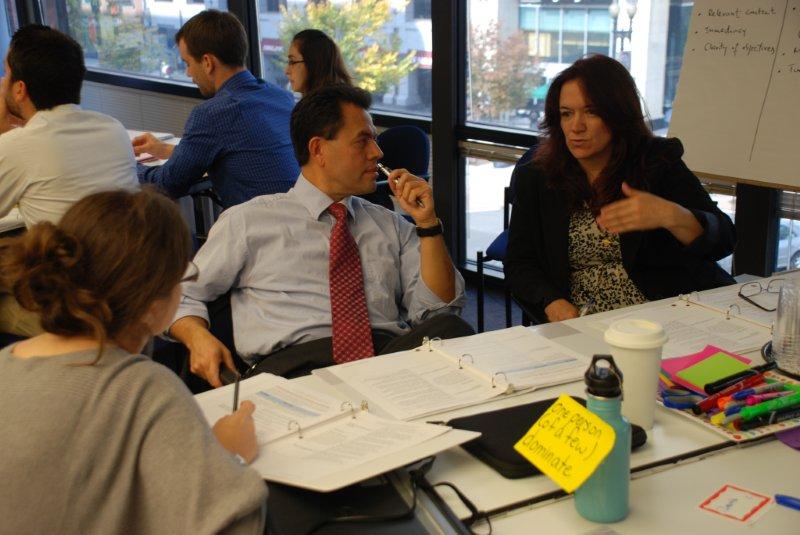Feb 24, 2014

Everyone strives to have a “full board," but filling the seats is not enough. A board is most effective and healthy when its members intentionally work at their role as board members. Below are 10 tips for board members who want to excel in their role.
*These tips have been written for not-for-profit boards. However, much is also true for other boards.
- Be prepared. A board meeting will be more effective, interesting and productive if everyone has thoroughly and thoughtfully read all the material being discussed before the meeting. Whether something is of high or low priority in the meeting, most documents and information are interwoven and connected, and therefor important. The more you know about the work of your board and organization, the better you will be able to offer ideas, make decisions, and volunteer for projects and activities.
- Be punctual and attend regularly. We all have numerous commitments and responsibilities – we are busy! To ensure the meeting finishes on time, it needs to start on time. Being punctual shows respect to the board and the work it does (you are saying, “This is important.”), as well as the organization (you are saying, “I care enough to be here and work to strengthen this organization.”). If you need to be late or are not able to attend, inform the board chair. The board will be better able to attend to work when there is a full quorum and punctual attendance.
- Be positive and affirming. There is nothing that can demotivate a board member faster than a feeling of not being appreciated or being undervalued. When work is done, it needs to be celebrated. When ideas are shared, they need to be affirmed. Creating a respectful appreciative culture on your board will help maximize the possibility of its member happily attending meetings and enthusiastically serving their full term (and beyond!).
- Be respectful. Most boards strive for diverse representation – this is good. However, with this diversity of people (whether cultural, gender, skill sets, experience, age, or faith) will also come diversity of thinking, styles of communicating, and expectations of a board. Affirming different ideas, inviting clarification of diverse thinking, and welcoming all questions will enrich your board, its governance and work, and you.
- Be a good listener. We all communicate differently and use language differently. Whether someone speaks softly or loud, uses few words or many, speaks eloquently or simply, each board member deserves to be heard. A healthy board meeting is a safe and respectful space in which everyone’s voice is invited, honoured and heard.
- Be a team player. Regardless of how active your board is, there is always work to do. When decisions are made, ideas are shared and recommendations are offered, there are tasks to be picked up – so help out. The old saying is true: “Many hands, make light work.”
- Be honest and transparent. There will be times when you are asked to do something you are not comfortable with, or vote on an issue that you don’t fully understand, or participate in something you have questions about. Stop and tell the group. Full transparency and honesty are critical for a healthy well-functioning board, and can foster respect and trust among board members.
- Be responsive. Although most board work happens during your regular meetings and in sub-committee meetings, there is often a need to get a response to an issue or question by email, Skype, text or phone. Respond as soon as possible. This can enable further work by board members or others involved, and shows respect to the matters at hand.
- Be loyal and a champion for your organization. Most of us are involved in multiple organisations, communities, networks, and social circles, offering constant opportunities to talk about what your organization (of which you are a Board member) does and what you are excited about. Whether you share a link to the organization’s website with a curious friend, invite a colleague to help out with an event, or slip some information to a family member, board members are important advocates for your volunteer organization and the people you serve. Maintain your loyalty to the organization and help build its support community!
- Donate regularly. If you believe strongly enough to be a board member for this organization, you should also feel strongly enough to support it financially. This loyalty and congruence is important for your level of commitment (you are saying, “I believe in this enough to give of my time and resources”), and for your messaging (you can say to potential donors, “We need your financial support …. I donate”). How can we authentically communicate that this is a worthwhile place to give generously, if you don’t believe/ practice this yourself?
What other tips do you have for being an effective board member? Share your thoughts in the comments section.

Want to make your board meetings more engaging and productive? Join us for a 2014 SURE-Fire Meetings 2-Day Workshop:
May 28-29 | Raleigh, North Carolina | with Karen Ridout
July 10-11 | Montpelier, Vermont | with Peter Perkins
Oct 23-24 | Minneapolis-St. Paul, Minnesota | with Michael Culliton



